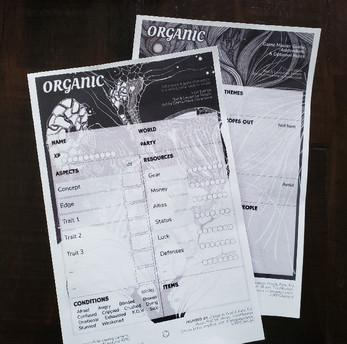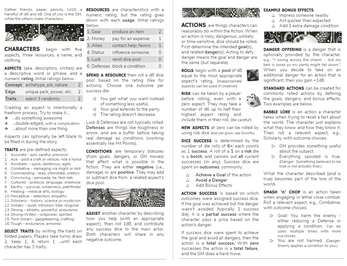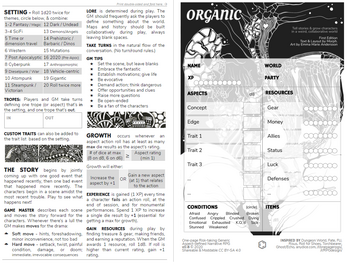Organic RPG
A downloadable game
Download NowName your own price
ORGANIC is a micro tabletop roleplaying game designed to be great for getting started with minimal setup, and letting the world and the characters grow during play. Roll for a random setting, select some random traits for your characters, write up a few aspects, and you're ready to go. Everything you need to play fits on one sheet of paper, and makes a nice little booklet when folded in half.
Created for One-Page RPG Jam 2020. The game is creative common licensed, so feel free to make your own mods, modules, adventures, etc. Artwork by the talented Emma Marie Andersson.
Want to discuss the game? Try Reddit /r/onepagerpgs/
| Status | In development |
| Category | Physical game |
| Rating | Rated 5.0 out of 5 stars (3 total ratings) |
| Author | Morph |
| Genre | Role Playing |
| Tags | micro-rpg, One-page, One-shot, Print & Play, Sandbox, Tabletop role-playing game |
Download
Download NowName your own price
Click download now to get access to the following files:
Organic One-Page RPG v0.8.pdf 728 kB
Organic One-Page RPG v0.9.pdf 5.1 MB
Development log
- Update v0.9Jun 16, 2023



Comments
Log in with itch.io to leave a comment.
I had a chance to run this over the weekend. This has a lot of what I like in a one-page but there are a few things that I don't love and maybe need clarification on.
1. Since all aspects start at 2, characters don't feel like the specialize in anything. I get the inspiration from Roll for Shoes, but over the course of our 3 hour one-shot, no one leveled up. I would probably let players distribute points how they like.
2. Risk dice and offered danger just seem like a bad investment if you're trying to succeed, but I haven't checked the math on these.
3. New aspects start at 1, but the risk dice section says they start at 0.
4. I am not sure what "The goal and the danger are the same, but separate" means for the purpose of play. If you apply a success to the goal of avoiding the danger, it is weird to say that you still need another success to "avoid the danger." I was running this as "yes, but something else unfortunate happens."
5. Love the Babble Lore move! Would like to see a supplement with more standard moves.
6. Regarding Gear vs Items, I imagine that whenever the players need to pull out some gear, it turns into an item. One of my players obtained a sword via plot reasons and made the case that he should get another D8, which felt right, but I reckon that's not the intent of items as designed. How would you represent the increased combat effectiveness of a sword vs being unarmed?
Thank you for the excellent, detailed feedback!
Some answers...
I looked over the odds for ratings:
If you want characters to feel a bit more like experts at the start, then it would be good to allow them to take one or two aspects at 3, 4, or 5.